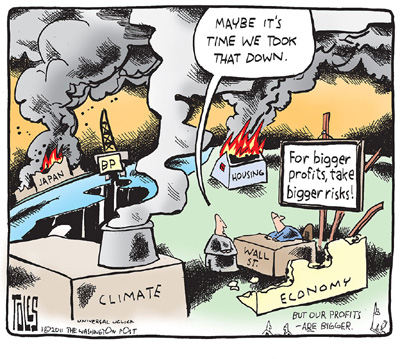sierraclub.org - sierra magazine - july/august 2011 - taking the initiative
By Carl Pope
BEVIES OF BLACK SWANS
Nuclear power's deadly vulnerability to unanticipated disasters

Cartoon: Tom Toles, Washington Post/Universal Uclick
Mentally unstable ballerinas aside, "black swans" are unanticipated events with enormous consequences. A prime example is the earthquake and tsunami in Japan and their effects on the Fukushima Daiichi nuclear power plant. On paper, nuclear energy is far safer than energy from coal or oil. But when nuclear power is visited by a black swan, the results can be catastrophic.
Earlier failures at Three Mile Island, Brown's Ferry, Chernobyl, and Davis-Besse were all "inside out" — that is, the fault was with the reactor or its operators. Fukushima Daiichi was the first "outside in" nuclear disaster: A major external event caused the reactor to destroy itself. In its wake, even nuclear boosters conceded that they hadn't fully considered the reliability of the guarantor systems that nuclear power relies on — the electrical supply, the backup power, the water source and conveyance system, the spent-fuel ponds, even the chemical consequences of using saltwater rather than freshwater on an overheating reactor.
Nuclear power is only one example of the susceptibility of industrial civilization (and perhaps human beings more generally) to a black swan. Investor Nassim Nicholas Taleb, who coined the term, advocates factoring in the risk of black swans when assessing any endeavor. In his view, smart investors put their money—and risk their future — on pathways where the surprises are likely to be positive and the downsides predictable and affordable. This is what most smart businesses do, as well as anyone who buys insurance. When Southwest Airlines hedged against big increases in the price of jet fuel a few years ago, it was likely to lose a little money—unless prices spiked (as they did), in which case it was protected against losing more money than it could afford.
Sadly, as a society we tend to reserve the upside black swans for private, inside investments while forcing public institutions to underwrite industries where the surprises can be catastrophic — nuclear meltdowns, the subprime mortgage collapse, and oil-drilling disasters all come to mind.
Humanity's latest gamble is ignoring climate change. Those endorsing it argue that the likely costs of preventing climate disruption exceed the probable benefits, particularly to the present generation. Not only is this conclusion almost certainly false; it's also largely irrelevant. The issue, as Taleb would point out, is not the likely benefits of action but the potential costs of inaction in the form of black swan climate changes: massive methane releases from the permafrost, the melting of the Greenland and Antarctic ice sheets, the weakening of the Gulf Stream. We can clearly afford a rapid transition away from fossil fuels; it won't be free, but we can pay the bill. What we can't afford is a collapse of our stable climate.
The very uncertainty that climate-change skeptics cite as logic for doing nothing, then, is actually the most powerful argument for urgently cutting out carbon. Many of the same people who think we should ignore the threat to the ice sheets also think we should ignore the risk of the meltdown of spent fuel in storage pools across the nation. This powerful cultural current allows insiders to gamble with other people's money and other people's lives in the pursuit of short-term gains. It's the essence of predatory capitalism.
Former defense secretary Donald Rumsfeld once famously warned about the "unknown unknowns," which is a good summary of the black swan. Learning how to account for these strange birds—and prepare for their terrible visits — is something our species desperately needs to do.
CARL POPE is the chairman of the Sierra Club. E-mail carl.pope@sierraclub.org; read his blog at sierraclub.org/carlpope.